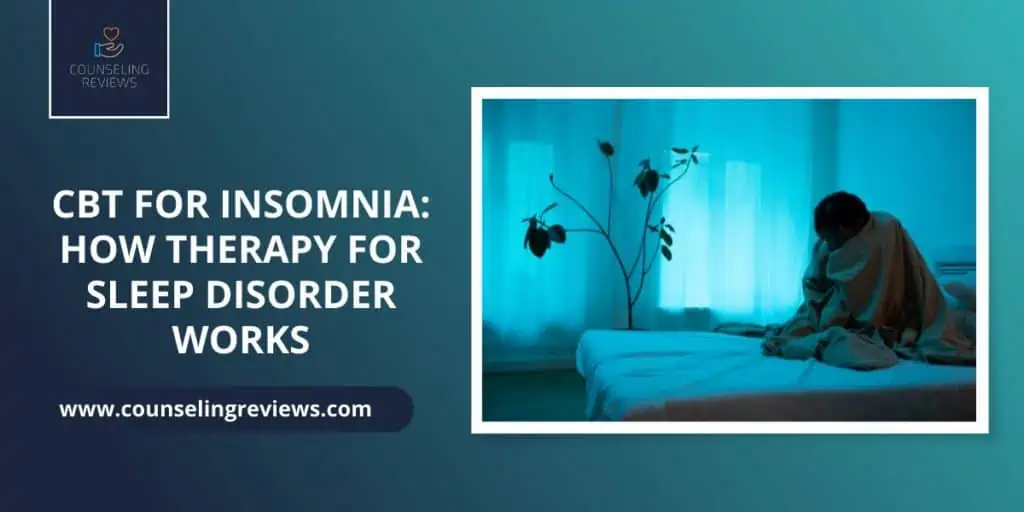Sleep is the lifeline behind any individual’s proper and healthy existence. In fact, a good night’s sleep does wonders for body recovery and optimal nervous system function.
Due to stress, underlying medical conditions, physical inactivity, and psychological reasons – or could it just be the pace of modern everyday life – the regular sleep cycle may get disturbed and we may develop insomnia.
Read all you wanted to know about cognitive behavioral therapy, how to treat insomnia symptoms here. We will explain how it works, and why those suffering from it should opt for such a treatment before resorting to a bottle of sleeping pills.

Is Insomnia Treatable: The Findings
According to the National Center for Biotechnology Information in the USA, research has shown that insomnia prevails in around 10%-30% of adults in the world population.
Although those who suffer from a chronic insomnia disorder might consult their doctor regarding prescription medicine, the American College of Physicians and other respectable physicians now recommend cognitive behavioral therapy as the first line of treatment. CBT has proven to have major effects on eliminating insomnia, which makes insomnia treatable!
Causes of Insomnia
First, it is necessary for the physician to determine if the patient’s sleeplessness is caused by medical or psychological factors.
The medical reasons that may induce insomnia are conditions such as snoring, sleep paralysis, restless legs, cataplexy, sleep apnea, hypnopompic or hypnagogic hallucinations, and excessive daytime fatigue.
The medical reasons can also be excluded by conducting lab tests for iron levels in the blood, liver, and kidney pathology.
Sleep hygiene has a crucial effect on sleeping. So, your sleep area must be separate from your workspace. The human brain is habitual and it associates different spaces with different habits.
If you try to sleep in the same area where you work, your brain might have a problem differentiating what activity needs to take place.
Also, bringing electronics (smartphone or laptop) to your bed is definitely a no-no.
The hormone that regulates your sleep-wake cycle, melatonin, is inhibited by the blue light generated by your mobile phone’s screen.
This makes it much more difficult falling asleep, staying asleep, and waking up the following day. To mend the issue, physicians recommend that you should not use any type of electronic device for at least one hour before going to bed
In these modern times where artificial light dominates the scene, a great portion of users was forced to limit or eradicate their screen time hours.
Daytime is for activity, while nighttime is for sleeping – simple as that.
How Therapy for Sleep Disorder Works
Cognitive Behavioral Therapy (CBT) for insomnia is an effective, behavioral therapy for insomnia that may be initiated as basic care. Insomnia therapy can be conducted through individual or group therapy sessions, telephone or web-based modules, or self-help books.
Treatment for insomnia includes three key phases:
-
- A certified healthcare professional will conduct medical screening and evaluate sleep quality.
-
- Identifying and addressing the causes and procedures that are unique to your situation in order to alleviate your sleeplessness.
-
- Gradually using methods to alleviate insomnia.
The first session would entail some kind of sleep restriction and can make patients even more tired than they are. A health-care professional will make his insomniac patient for a benevolent reason – to get them to reorganize their sleep area and cycle.
Professionals typically adjust patients’ sleeping schedules by making them wake up early since they might tend to go to sleep later than recommended.
Anxiety problems are often treated using a similar approach to this one. What’s more, physicians often resort to enforcing sleeplessness in order to lay the framework for a proper sleep routine.
By the following session, patients will likely feel agitated and anxious. But, that seems to be the goal of the treatment, as eventually, patients will get so tired that they will have no other option but to go to sleep.
Following this step, physicians will measure the sleep patterns in their patients and recommend a plan for the following week or so.
If cognitive behavioral therapy is unsuccessful, physicians might recommend the use behavioral sleep medicine part of a shared decision-making approach with their patients. This should include a thorough discussion about the harms, benefits, and costs of sleep medications.
CBT vs Pills
When it comes to treating insomnia, two common approaches stand out: cognitive therapy (CBT) and sleeping pills. CBT or cognitive behavior therapy, focuses on addressing the underlying causes and behaviors that contribute to sleep problems, aiming to improve sleep quality in the long term.
On the other hand, sleeping pills offer effective short term treatment by promoting sleep, but they may come with side effects and the risk of dependency.
CBT has been shown to be highly effective in treating insomnia, providing lasting results without relying on medication. It helps individuals develop healthy sleep habits and manage thoughts and behaviors that interfere with sleep. In contrast, sleeping pills offer immediate relief but may not address the root causes of insomnia.
Ultimately, the choice between CBT and sleeping pills depends on individual preferences and the severity of the sleep problem. Consulting with a healthcare professional can help with sleep issues and determine the most suitable treatment approach, ensuring restful nights and improved overall well-being.
How the 3 Cs of CBT Relate to Sleep
The Three C Method assists individuals to identify bad feelings, confront them and adopt more optimistic ways of thinking. Practicing the 3 c methods can help you convert automatic negative thoughts into positives.
-
Cognition: CBT addresses cognitive aspects related to sleep by examining and challenging negative thoughts and beliefs that contribute to insomnia. This involves identifying and replacing unhelpful thoughts and worries about sleep with more rational and positive ones. By reshaping cognitive patterns, individuals can reduce anxiety and create a more conducive mindset for sleep.
-
Behavior: CBT focuses on modifying behaviors that disrupt sleep. This includes establishing a regular sleep schedule, practicing good sleep hygiene (e.g., creating a comfortable sleep environment, avoiding stimulating activities before bed), and implementing relaxation techniques. By adopting consistent and healthy sleep behaviors, individuals can improve their sleep quality and establish a more sustainable sleep routine.
-
Conditioning: CBT addresses the conditioning aspects of sleep by re-establishing the association between the bed and sleep. This involves techniques such as stimulus control, where individuals limit activities in bed to sleep and sex only. By breaking the conditioned link between the bed and wakefulness, individuals can strengthen the association between the bed and restful sleep.
CBT for Your Ultimate Health Sleep – The Verdict
Cognitive behavioral therapy has proven to be a more than successful treatment for insomnia. Persistence and hard work are crucial factors for this line of treatment to take full effect.
The faster you acknowledge the underlying condition – the sooner you can start working out a solution that will benefit your sleep pattern. And whatever you do – never reach for a bottle of pills without a doctor’s recommendation.
Remember, there’s only so much meds can do – your treatment will only work if you do!
CBT Insomnia FAQs
Generally, CBT-I patients improve their sleeping habits after 2 to 3 weeks. CBT has been shown to help reduce sleep disturbances. Important, CBT-I provides an effective treatment as with hypnotic medication, and its effects last a long period.
Often after two treatment sessions the symptoms are noticeable. Some improve in 4-5 days but some may still be needed for longer. Treatment in group or individually has measurable results.
Selftalk affects sleep. We have a lot of ways of focusing on the things we think about. It applies negatively to a person’s self-image. Negative self-talk causes anxiety and irritability when you get to your bedtime. Maybe you fear throwing out and turning or not having enough time for yourself. Positive self-talk can encourage you to maintain good sleep habits.




